AN INTERVIEW WITH PATRICK SULLIVAN, Patrick Sullivan Wines (Gippsland, Vic)
Tell us who you are and where we are.
My name is Patrick Sullivan. We are in the Baw Baw Shire in Gippsland and I make wine here and grow grapes.
My name is Patrick Sullivan. We are in the Baw Baw Shire in Gippsland and I make wine here and grow grapes.
My background is in statistics, I started studying to be an actuary and got a little way through that until I thought maybe I wanted to make wine instead. So I switched to studying viticulture in my undergraduate, but I still understood how to look at numbers and look at things. Then, I saw this region that was here, which said you know, no chance at climate change, it was really cold at night, had beautiful, nice, warm days. No real extreme temperatures, plenty of rain, and I’m like, “Well that’s where I want to live.” I grew up in country Victoria, central Victoria through the drought years, and I never wanted to go back to that.
Then I spoke to a lot of people around here and also in the Yarra and people that are on red soil, and I always wanted to be on a volcanic site and that was really important to me, to be on volcanics, obviously dry growing. They’re two really hard things to do because generally with volcanics there’s a really low water holding capacity, so you need plenty of regular rainfall to do it.
Anyway so that’s why we came here. When I spoke to people they said it’s too hard, things don’t grow too well there. I was like, “Well that doesn’t really sound like a very clever reason to me.” Back when I was 22, when I decided this was where I wanted to come, I met a guy, Bill Downie, who lives down the road. He said, “Yeah, you can do it. Have a look at my vineyard.” That was the first time I’d seen high density vineyards in Australia, and someone that was pretty committed to doing it in a similar way to I was committed to doing it. I was like this is a pretty nice place and so I ended up doing what I could to be able to afford to buy a farm here.
Here you’ve got humidity, got red soil, got stones in the soil, it’s kind of a rare fit. I was like, as soon as we walked in the gate, my wife Megan said, “We can’t not buy this farm.”
2014 is when we moved. We’d made up our mind maybe end of 2013, this is where we’re going to move to. It was a bit of a challenge to buy it because of what the banks needed from someone like me. Yeah, we ended up, it took us about 10 months to sign the contract and then we got it over the line and moved just before Christmas 2014.
This is 173 I think. It’s really hard to tell because the undulation is really hard to understand because of it, the forest and the undulation.
Yeah this is the very start of it. Outside here is like a volcano bowl and then we’re motored, so we’ve got, since we’re volcanics, obviously lava flow has happened at some stage, and then things have been churned up. So on either side of us out here and other edge of the property, there’s basalt streams that run, flow around us. We just got water pouring out of the hills and flow around us, and that’s what kind of gives us the boundaries.
We’re just about to do, I think it’s like 30 hectares, revegetation. We’re going to do that in about a month’s time, so we’ll be completely surrounded by forest pretty soon. Should be lovely. That’s our project for the next three or four months.
Yeah, everything. So when we moved here in 2014, or even before that, we started discussions with a few other people who had vineyards, and were a little bit tired or done and trying to move on. The last two years or so, we’ve signed 10-15 year leases on everything. Converted everything to organic, organic viticulture. We farm everything. Everything we make we farm ourselves. Everything’s about an average age of about 35-40, everything’s never ever been irrigated, which to me is really important. Obviously organically farmed, everyone said we couldn’t do it in this region either, but we did it pretty well. We had a tough season, but it was fine.
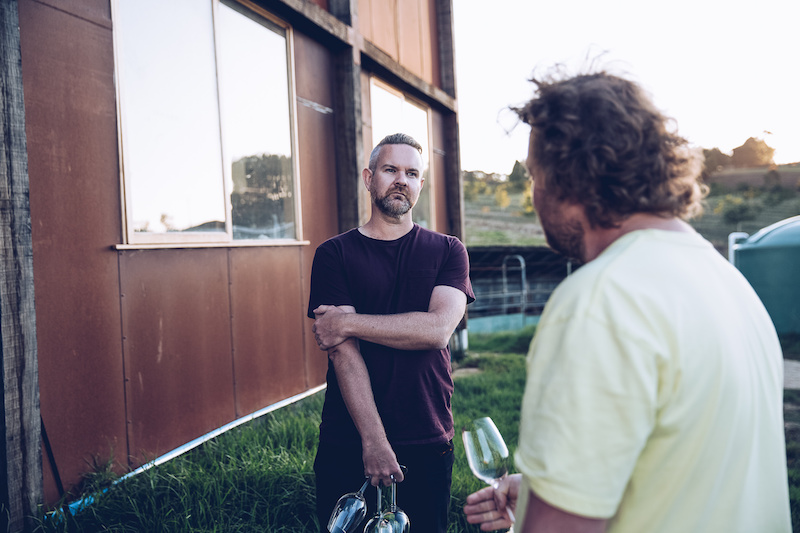
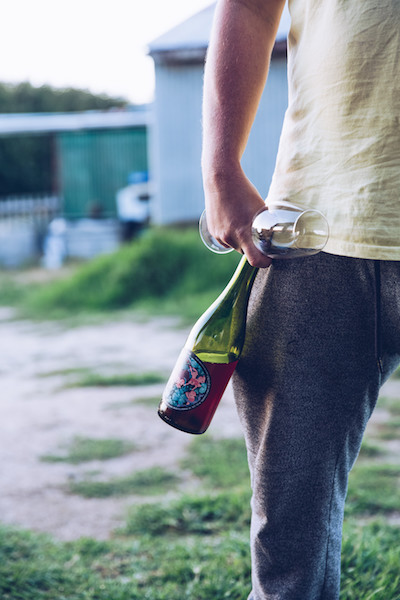
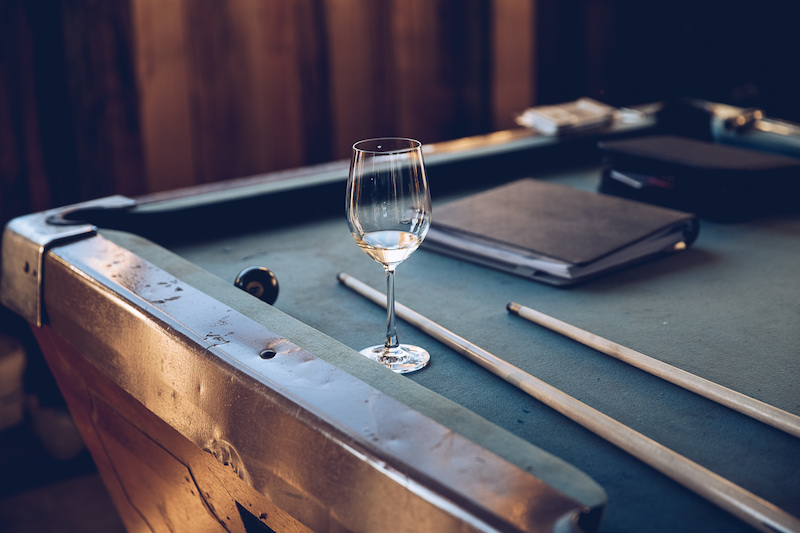
Yeah of course, but biodynamics is about, I mean most of the people I’ve spoken to that do biodynamics never really read the lectures and it just kind of … I had a discussion with a friend of mine who’s a biodynamic farmer in Oregon, and I’m like, “What do you do for preparation?” He goes, “Oh, we get them from New York.” I’m like, “You mean you fucking couldn’t buy cow shit on your side of the country, you had to fly it over to your place? Isn’t biodynamics about close farming, ya dickhead?” He goes, “No, but it’s just better,” and I’m just like, “Fuckin hell. What are you doing?” No wonder there’s so many shootings over there, people just believe in weird shit!
Biodynamics is about your farm, what happens on your farm and how it happens. It doesn’t matter what the animals are. You can take the base of the preparations. Most of what [Rudolf] Steiner talks about comes from [Johann Wolfgang] Goethe, and most of the guys practicing biodynamics wouldn’t even know who he is. But he was the foundation of the majority of the biodynamic, sort of the weirder stuff, which a lot of it does make sense if you read the stuff, but a lot of is pretty out there. Which is fine. But yeah, I guess you would say we farm without chemicals here, and we have a spiritual tie to the place and we do look at things, “How’s that leaf looking? What’s the shape? What does it need? What is it telling me? Is it pointed, does it have a good structure, does it not? What’s happening in the environment? What’s happening up in the forest? How does that then connect with what’s happening down here? What is that cool breeze that I get from the forest every night, what does that do to the plant? What does that make deficient, does it give excess, or does it do anything?” That’s organic biology, dynamic biology that’s what it is.
A true true sense of it. It becomes quite frustrating when people just, especially at the moment when people talk about, “No sulfur, no sulfur.” And you’re like, “Yeah but how much sulfur do you put in the vineyard?” First thing they say, “We don’t know we don’t farm anything.” You’re like, “Okay, fair enough.” Then they go, “Yeah but sulfur in the wine.” You’re like, “you just put on 40 kilos an acre over the last seven or eight months, who gives a fuck what you do in your wines.”
We don’t use sulfur past Christmas. Most of the season isn’t with sulfur in the vineyard because its killing everything. Its killing everything, it just, it’s softer than a systemic, but it’s just nuking everything and it washes away. But what’s wrong with putting a tiny little bit, if the wine is looking dodgy, putting a tiny little bit in, why’s it even a discussion? Why isn’t the discussion about what’s happening out there? What’s happens in the 10 months it takes to get it into your glass, not the two weeks because it’s probably 35 degrees and you’re picking the things because you got them planted in the wrong spot. What are you doing?
I think we’re running out of things to talk about to hide the fact that nobody is doing anything other than wandering around wine festivals and having a nice time. I think we’re running out of things to talk about there and also the people that talk about it the loudest are generally the ones that are not connected with what’s happening outside. I think we’ll talk about it for a while. And don’t get me wrong, the best wines I’ve ever had have been wines without sulfur dioxide added to the wines. They’re the best wines I’ve ever drunk. But unless you’re farming them with the utmost care, and your vineyards are of the utmost balance, things are going to go wrong.
Yeah. I know that if I get a two consecutive 45 degree days in January and then maybe a follow up a week later, I’m going to be on Brett-watch. I know that Brett’s coming and that that wine’s probably going to need sulfur because there’s going to be an imbalance. If I’ve had a really even growing season and my canopy’s been looked after perfect, all the bunches are fine, they’re evenly spaced, I know I can probably add no sulfur to that wine and I’ll be okay.
You can’t just go “no sulfur”. How can you blanketly say that when you’re not with your grapes all year round or you’ve had a difficult season, or you’ve had a heap of rain? There’s one tank over there, we had a really dry season, so everything’s fine. The wine in that tank over there looks amazing. But we had 30 ml of rain, three days before we picked that. I know that’s going to have issues, I know it’s going to be fine, but there’s no way I would not add sulfur to that as a finished wine because I know it’s going to have issues. I know there’s going to be shit going on in there that I can’t control.
Totally, it’s been around for thousands of years that we’ve used it. The point that it’s even a discussion, I just don’t even understand why people talk about it. It is, I’ve sat and I’ve gone, “It’s just because you guys obviously don’t have a connection with what’s actually happening out there because they’ve thrown so much sulfur on that vineyard this year because you’ve told them they can’t use anything else, and they’re growers. They’re just going to bomb the shit out of things because they don’t want to lose crop and they don’t know what they’re doing. You’re just telling them what you have to do and you’re not a grape grower so you have no idea, he has no idea, so he’s just going to bomb the fuck out of it.” That’s just the way it works.
I think, obviously I haven’t been gifted with a vineyard, but if I could be, in my own style and way, if I could be Michael Dillon, 10-20 years’ time, I’d be really stoked. He’s not a fence-sitter but he can walk in whatever world he wants and people are going to stand up and go, “That’s just delicious. That’s really wonderful wine.”
I really find it difficult to go in a niche, I just want to make wine that I think is delicious and is good to drink, and I want it to be appealing, too. I want people to pick their glass up and say, “That’s a really good wine.”
I think that’s really important to me, I don’t really want to be in anything. If I’ve got to pigeon hole myself, it means I’m not doing a good enough job and I can’t sell my piece, so I’ve got to ride the coattails of something else. I just want to say, “Here I am. These are the wines. Do you like them?”
There’s a certain, there’s a very famous restaurant, probably the most famous restaurant in Melbourne, and we went down and sat down for an appointment. The lady in there, is really lovely, she said, “I didn’t really want to take this appointment because I don’t really like the genre of wines that you’re in.” I’m like, “I’m not in any genre.” She goes, “But I hate natural wine.” I’m like, “I don’t fucking do natural wine.” She’s like, “Oh, that’s okay then.”
She sat down and said, “I love these wines.” I’m like, “Yeah.” She goes, “well, I’ll pour them.” I’m like, “Yeah. See you later.” So, I want that.
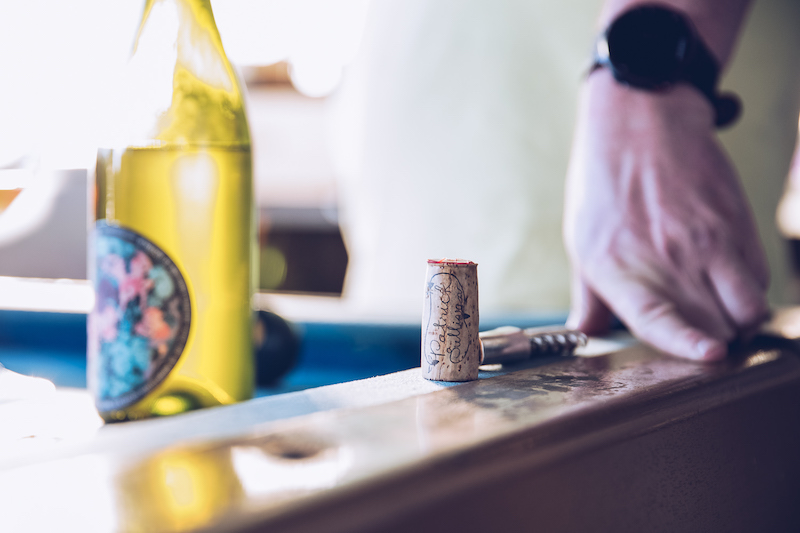
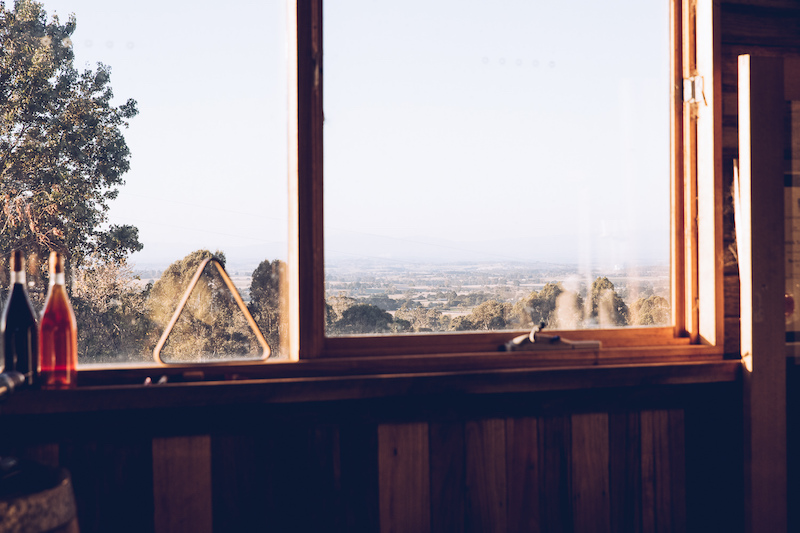
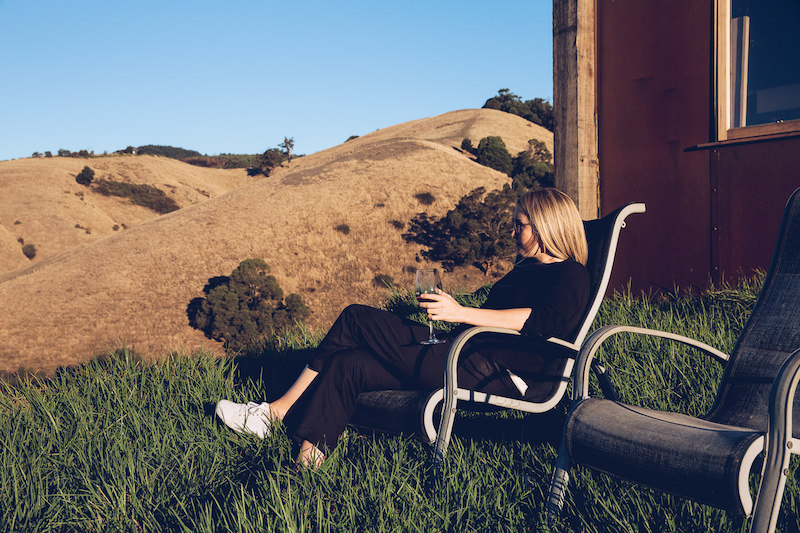
What’s in the glass is right. I think that’s what on the surface the swing is. What my belief is, because I’ve been sitting around thinking about things for a long time about what it means, or what is this pendulum shift because I want to get out of that. I don’t want to be in a pendulum shift, how do I get out of that? I look at Europe and why do we continually go there sometimes when we go out and pay the money that we do. It’s because the vineyard generally transcends the producer or the winemaker, whereas in Australia, our history is based on, I guess, Penfold’s Grange. Which is a great wine, but no one cares where the fruit comes from.
The winemakers don’t care where it comes from; they’re making wine that’s about them, or about the people before them. It’s a great ideal, but it means that you’re always trying to construct something. And the same happens in the States, actually, and they are in a similar place. It’s happening now, and thank God for places like the Mornington Peninsula, where you have rich people that just follow what their consultant says, but they’re making all their own vineyards because they can afford to. At some stage, they’re all going to go, or someone else will come along and people are going to be making single vineyard kind of things. This is what’s happening.
In Victoria we can do that because we haven’t got a history of grape growers here, we’ve got a history of vignerons because we’ve always had Melbourne as a market. We’ve always had small little vineyards, where in South Australia they’ve always had an industry of grape growing, and winemaking. Here in Victoria it’s generally the same thing. It’s just that we’ve been so influenced by what’s happening over there in South Australia. That won’t change in South Australia. That’s the way South Australia is, you’ll always have a few people who do certain things, but that’s the way their industry is.
But here in Victoria and Tasmania, and in a small part, Western Australia Margaret River, it’s a very, very different culture towards vignerons.
I honestly think, and I hope, but I think that’s where we’re going to be in 20 years. I think we’ve had a really quick shift and change and everyone’s sort of woken up. You’re still going to get some people who will go, “Well I’m just going to keep buying grapes. I’m going to have to do a few more tonnes, but I’m going to have a decent business and that’s cool.” But we’ll have more of the people that are going to go, “You know what, I’m just going to concentrate on what I’m going to do and I’m going to try to sell it locally. I’m going to concentrate on this and that’s how I’m going to go about things.”
I honestly think that. Maybe it’ll take 20 years but hopefully it’s only 10. That’s when you get longevity. That’s when you get multi-generational farming. That’s when you get all sorts of things, which is what we need. We need somebody, whether it’s multi-generational, doesn’t have to be in the same family, people that are custodians over a certain piece of land and they’re really committed to doing it. I hope, that’s what I think is happening, and that’s a longer pendulum, less schizophrenic.
It’s nature. It’s no longer fluctuation. It’s what we want, especially with Asia coming on. We have to change our mentality. We can’t just do the same as what we did in the U.S. and make a heap of money and then fuck it right up.
I think we have a couple things going for us. We have volcanic soil which is quite important, and that mineral content. When you’re looking at the other side of the hill, so Leongatha and all that sort of stuff, generally end up with finished wines at 14% but naturally above ph 3.5. If you live in the Yarra Valley ph will be 4.2, and you’d be struggling to get it 14 to be honest with you.
You don’t want high alcohols all the time, but that’s what that place gives you down there. Generally, the people that are growing grapes over that side, they’ve planted in a lovely way, so high density and all these sorts of things that help with that ph and keeping really good acid and structure.
On this side of the hill, we have a really interesting micro-climate in that we have always a touch of humidity. We have like a funnel that the weather comes through between the Baw Baws and here and the Strzeleckis, we always have humidity in the air, which is really good for Pinot Noir thin skin, it can be hazardous if there’s too much, obviously, because of disease. But if you have it in the right amount, like we do here, you get really aromatic wines.
I mean, have a look at how soft it is out there at the moment. This is what the evenings are like here. That lends itself to highly aromatic wines. Plus volcanic soil, no need for irrigation because we get enough rain at the right times of the year. I think that’s what lends us to these wines that have incredible power, but are aromatically and structurally precise and they’ve got amazing direction and acidity. The wines can be strong but they of course can be quite feminine and that’s what I think this part of the world lends itself to.
What am I listening to at the moment? Pinball Wizard is what I’m trying to play. Who do we listen to? I listen to this and that. Depends, I don’t do late nights anymore. Rob usually listens to some sort of techno thing. Yeah.
Last year we listened to heaps of MTV Unplugged. Alice in Chains and Nirvana was on all the time. This year’s been different because we’ve probably pulled two late nights out of the whole harvest. But because it’s all own our fruit, it’s kind of like we get up, everyone works hard for a couple of days. Then it’s like, “Lets just chill out for a bit.” Then we’ll work hard for a couple of days, then we chill out for a bit. It’s just not as intense as when 10 tonnes of fruit arrives in the back of a truck at 8:30 at night and you’ve got to deal with it all. It just doesn’t happen like that anymore. It’s kind of like, “Oh yeah, picking Chardonnay today.” Everything’s just lovely.
First time with Pinot? Yeah. It depends, yeah. It was Macedon Pinot at Bress in central Victoria. That would have been my first time handling Pinot, and I just remember it being… I’d been handling a lot of Shiraz and things like that but then seeing that… when I was there we worked in the vineyard all year, and after that we saw the fruit come in.
Obviously I started in the winter and went through and saw the fruit come in. You could see the structure, and you could see the liveliness of it, and the lightness of it, the intensity. Then to be able to follow that through and see when things are cloudy and the wine settled out, and then you see the precision. It could be a massive Shiraz, you see this structure, it’s not clumsy, there’s just a lot to see.
The core of the wine is also very, because it’s all pulled back, the core of it is so prominent because you can see all this roundness and all this weight, but you can see the core. The bones of the wine are so evident and that was kind of what drew me in. Obviously it’s more aromatically pleasing for me personally, but just to see how powerful something can be, but also see at the same time how lean it can be, I guess that’s what drew me into it.
It would be Amy Winehouse or something, that would be kind of cool.
Because it’s erratic and kind of … it can be real fucked up but it can be seriously beautiful, depending on what day you get it. It’s certainly not relaxed or chilled out, it can be quite venomous when it needs to be. Yeah definitely somewhere like that.
It’s probably sitting on those chairs, sit on those up the front and see what it’s like, it’s pretty nice. Probably there, I like to drink wine just out in the front there. This time of night, sitting on those two chairs out front, it’s pretty good.